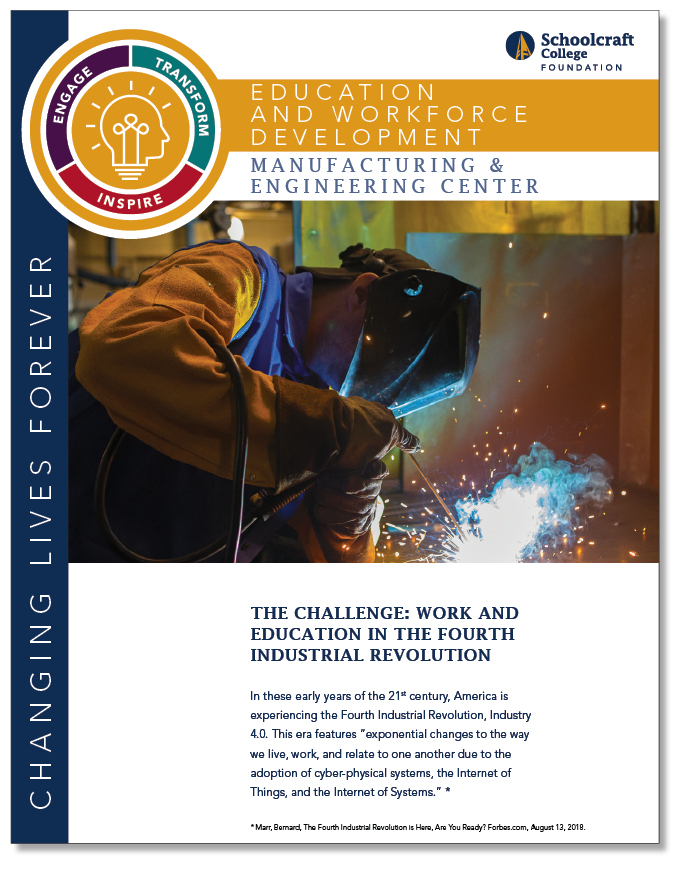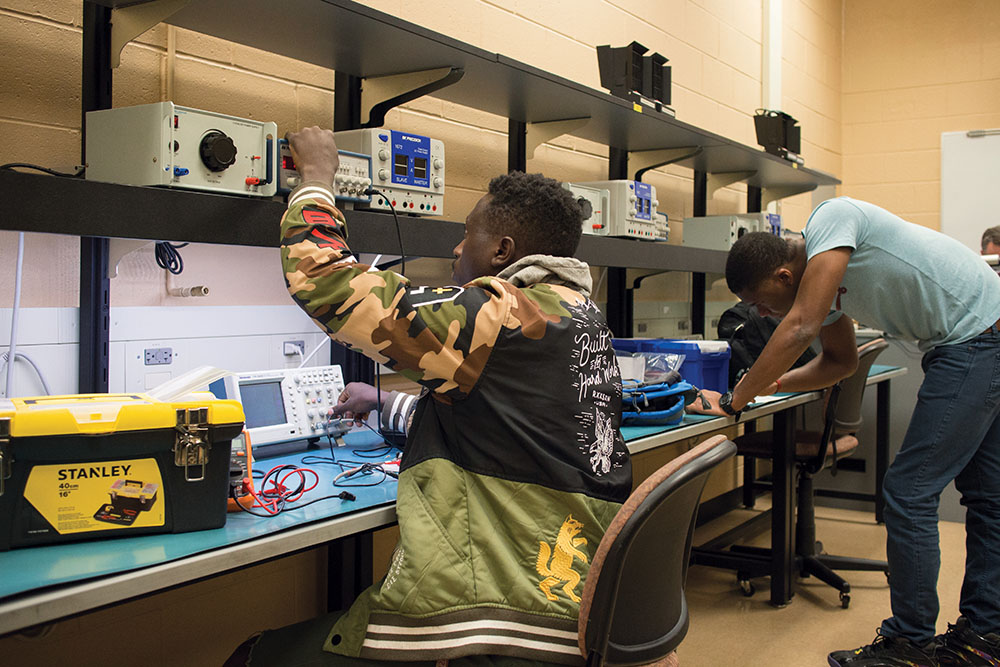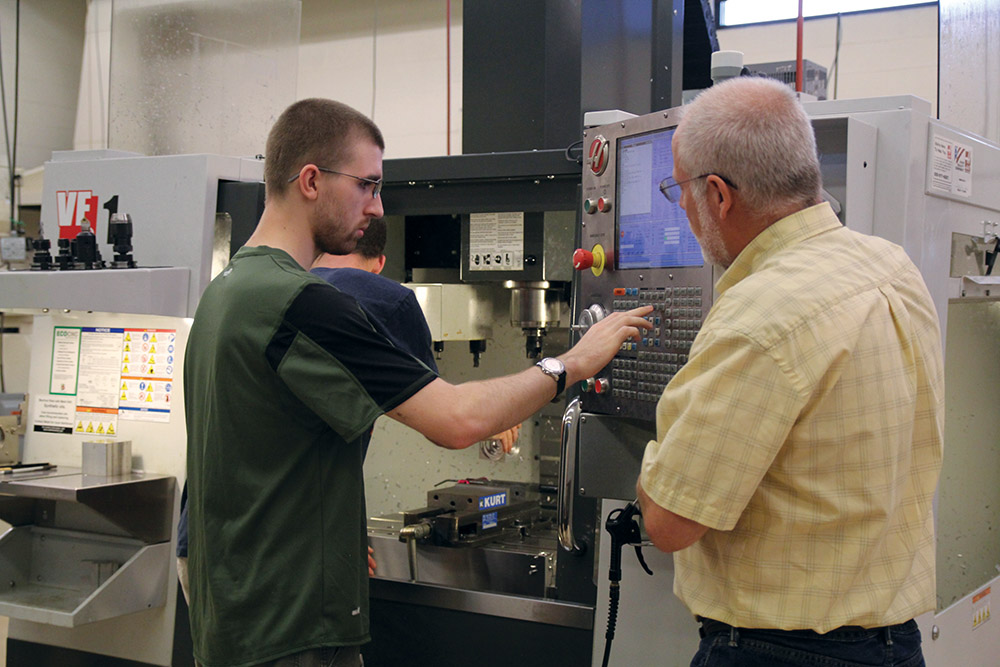Manufacturing & Engineering Center
The Challenge: Work and Education in the Fourth Industrial Revolution
In these early years of the 21st century, America is experiencing the Fourth Industrial Revolution, Industry 4.0. This era features “exponential changes to the way we live, work, and relate to one another due to the adoption of cyber-physical systems, the Internet of Things, and the Internet of Systems.”*

*Marr, Bernard, The Fourth Industrial Revolution is Here, Are You Ready? Forbes.com, August 13, 2018.

The challenges of this revolution are profoundly felt in Southeast Michigan. Attitudes and expectations honed by 20th century technologies, employment practices, and social outlook are being shaken and re-formed. It’s time to flip the foundation of learning from simply skill-based preparation for a lifelong job to developing lifelong learners who can adapt to varied and multiple work environments and readily shift between different careers, some of which may not exist today.
THE OPPORTUNITY: Schoolcraft College – Key to the future Vitality of Community and Economic Development

Consistent with the college’s Vision, Schoolcraft is preparing today to meet 21st century challenges by being the provider of choice for the future labor force in Southeast Michigan.
“Educating and preparing our workforce for the changing world of work is critical to Southeast Michigan’s future economic growth and success.”**
** Source: Southeast Michigan Council of Governments (SEMCOG)
THE NEED: $2,000,000
($1.4 MILLION EQUIPMENT & PROGRAM NEEDS
$600,000 APPRENTICESHIP READINESS & INTERNSHIP PROGRAMS)
VISION 2025:
Manufacturing & Engineering Center

The new Manufacturing & Engineering Center (MEC) is a new facility built through partnerships and college bonds.
Located just nine minutes from Schoolcraft’s Livonia campus, this 48,000 sq. ft. building at Glendale and Merriman roads is the new home for Computer Aided Design (CAD), Engineering, Electronics, Advanced Manufacturing, Mechatronics, Metallurgy, Plastic Technology, Robotics & Automation, Occupational Safety, and Welding.
The MEC more than doubles Schoolcraft’s capacity for workforce development programs. It will serve 300–400 students each day and offer opportunities for dual enrollment/middle college for high school students, apprenticeship training, and workforce development training such as CNC machining, robotics, and welding “bootcamps.” The MEC will increase capacity for an additional 100 students in the first year alone, minimum.
Embracing the concept of providing transformational learning experiences, Schoolcraft is determined to meet the needs of the surrounding community. The MEC is one way that Schoolcraft College is investing resources to meet the labor demand for engineering technology professionals.
While construction funding is secure, there is need for philanthropic support for additional equipment and innovative programs that help educate the future engineering technology workforce.
NEEDS INCLUDE:

Equipment: $1,400,000
Funding would provide the opportunity to purchase, update, and maintain state-of-the-art equipment and anticipate future educational needs. These improvements would also increase the capacity in all of the engineering technology programs.
Schoolcraft Apprenticeship Readiness Program: $400,000 over four years
US Department of Labor Registered Apprenticeships and other work-based learning programs are excellent ways for students to work-to-learn. The Apprenticeship Readiness Program helps prepare students for apprenticeships and includes four foundation courses required for professional trades: Technical Math, Occupational Safety and Health, College and Career Readiness (‘essential skills’), and an elective in their area of interest (e.g. Welding, Advanced Manufacturing, Computer-Aided Design). After successfully completing these four courses, students are presented to companies who can hire them and start them in a Department of Labor Registered Apprenticeship Program. Students will then be paid as employees while completing their education and training required to obtain “journeyman” certification.
This program acts as a springboard to start students in the professional trades and includes advising students for academic programming, resume preparation, career exploration, job searching, and interviewing. The cost for the four courses is approximately $2,500 per student and provides emergency funds to help students in need of transportation or other costs, if needed.
Occupational Programs Internship Program: $200,000 over four years
Funding would support an Internship Coordinator who works directly with students, employers and faculty to assist students in finding jobs. The Internship coordinator develops close relationships with a variety of industry partners and helps develop students and programs that best meet the needs of local employers.
